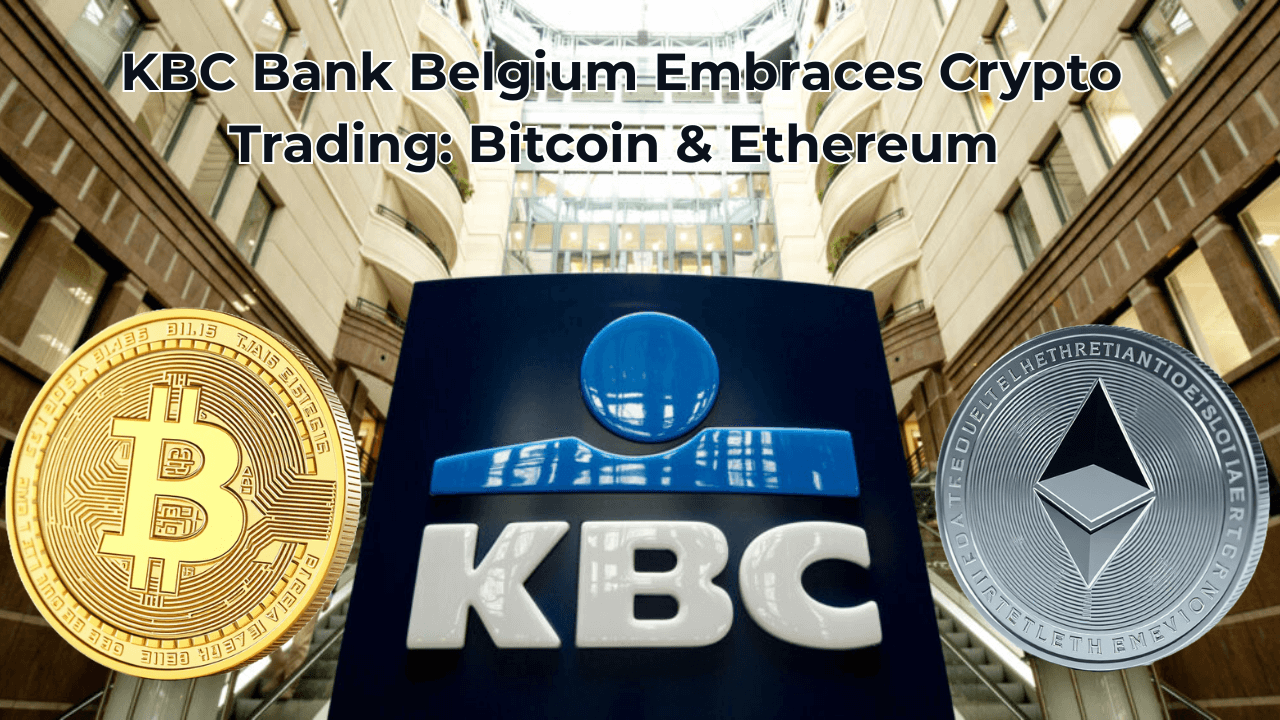Belgium’s KBC Bank, one of the country’s largest financial institutions, has made a decisive move into the digital asset space by launching a crypto trading service for retail customers. This strategic pivot empowers KBC clients to directly buy, sell, and hold leading cryptocurrencies—Bitcoin (BTC) and Ethereum (ETH)—within the bank’s official app. The integration marks a pivotal moment for Belgian fintech adoption and reflects the growing global convergence between traditional finance and blockchain innovation.
KBC Bank’s Strategic Entry into Cryptocurrency
KBC Bank has launched this service exclusively for its retail clients, initially enabling access to two of the most prominent cryptocurrencies:
- Bitcoin (BTC) – the first and most widely recognized decentralized digital currency.
- Ethereum (ETH) – a decentralized platform enabling smart contracts and decentralized applications (dApps).
The service is fully integrated into KBC Mobile, the bank’s digital platform that has over 1.9 million active users in Belgium. This seamless experience allows customers to access crypto markets without relying on external exchanges or wallets.
How the KBC Crypto Service Works
Unlike third-party crypto exchanges, KBC offers a custodial crypto service—meaning the bank securely holds the digital assets on behalf of users. Key service features include:
- User-Friendly Interface: Crypto trading embedded directly within the mobile banking interface.
- Real-Time Price Feeds: Live price charts for BTC and ETH.
- Instant Buy/Sell Execution: Customers can purchase or liquidate assets instantly using their existing KBC accounts.
- Transparent Fees: A flat percentage-based transaction fee disclosed upfront.
- Secure Custody: KBC maintains private keys and wallet security, removing the burden of self-custody.
Mermaid Diagram – KBC Crypto Service Flow
mermaidCopyEditgraph LR
A[User with KBC Mobile App] --> B[Access Crypto Tab]
B --> C{Choose Asset}
C --> D[Buy BTC]
C --> E[Buy ETH]
D --> F[Confirm Purchase]
E --> F
F --> G[Funds Deducted from KBC Account]
G --> H[Bank Custodies Crypto]
H --> I[Portfolio Displayed in App]
Regulatory Compliance and Transparency
KBC’s entry into the crypto space adheres to stringent regulatory standards set by the Belgian Financial Services and Markets Authority (FSMA) and the European Union’s Markets in Crypto-Assets Regulation (MiCA). Key compliance factors include:
- Know Your Customer (KYC) and Anti-Money Laundering (AML) protocols.
- Customer Education Tools to ensure responsible investment behavior.
- Disclosure of Risks associated with cryptocurrency volatility.
By complying with MiCA’s structured guidelines ahead of its full implementation in 2025, KBC Bank positions itself as a trailblazer in compliant crypto-financial services across the Eurozone.
Why This Matters: KBC Bank vs Traditional Exchanges
KBC’s crypto trading solution disrupts the dominance of independent platforms like Binance, Coinbase, and Bitstamp in Belgium. The advantages of using a bank-integrated crypto platform include:
| Feature | KBC Bank | Traditional Exchange |
|---|---|---|
| Custody | Bank-held | Self-custody or third-party |
| Fiat Integration | Seamless with EUR account | Requires transfer from bank |
| Security | Bank-grade encryption | Exchange dependent |
| Regulation | Fully regulated under Belgian law | Varies widely |
| Support | In-app and bank branch | Mostly online only |
Market Impact and Strategic Outlook
KBC’s crypto offering reflects broader trends in Europe’s banking landscape. More traditional banks are likely to follow suit in 2025 and beyond, especially under EU-wide MiCA compliance. This move:
- Opens the crypto market to older and more conservative investors.
- Boosts crypto adoption in Belgium’s highly regulated financial sector.
- Sets a precedent for Eurozone banks exploring DeFi and tokenization.
Predictions:
- Increased institutional adoption of digital assets in Benelux countries.
- Rising demand for tokenized investment products.
- Integration of staking services for Ethereum within banking apps.
- Expansion into stablecoins such as EURC or USDC for payments and savings.
Customer Feedback and Sentiment
Initial reactions from KBC’s user base have been largely positive. Customers appreciate the simplicity and security of the service, especially those new to crypto. Common feedback includes:
- “Finally, I can invest in crypto without leaving my banking app.”
- “I trust KBC more than external exchanges.”
- “It’s easy, transparent, and safe.”
Future Developments: What’s Next for KBC Crypto?
KBC Bank has signaled this launch as the first phase of a broader digital asset strategy. Potential future developments include:
- Addition of more cryptocurrencies, such as Solana (SOL), Cardano (ADA), and Chainlink (LINK).
- Integration of blockchain-based payment rails for instant cross-border transfers.
- Tokenized bonds and securities within the KBC investing suite.
- Personalized investment analytics powered by AI and DeFi yield models.
Conclusion: A Bold Step Toward Mainstream Crypto Adoption
With the introduction of Bitcoin and Ethereum trading through its mobile app, KBC Bank has set a new benchmark in retail banking innovation in Belgium. As regulatory frameworks mature and customer demand accelerates, the convergence of traditional banking and digital assets is no longer a vision—it’s a reality, and KBC is at the forefront.
By offering crypto services in a safe, regulated, and easy-to-use manner, KBC is not only meeting customer expectations but shaping the future of digital finance in Europe.







